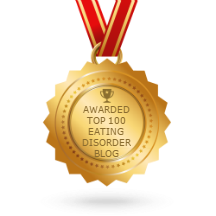- Home
- About
-
Services
- Therapy
-
Eating Disorder Trainings
>
- Clinical Approaches To Treating Body Image Issues
- Clinical Approaches To Treating Bulimia & Binge Eating Disorder
- Finding Freedom From Binge Eating
- Finding Freedom From Anorexia
- Supporting A Loved One With An Eating Disorder
- Eating Disorder Recovery Road Map
- Healing From Body Hate And Practicing Self-Compassion
- Common Questions
- Blog
- Press
- Contact
|
“It seems like I’m actually experiencing my feelings, now that I’m no longer bingeing and purging my emotions,” my client in recovery from bulimia shared.
Eating disorders are believed to be caused by a combination of factors including, genetic, temperamental, and environmental influences. However, one thing that almost all of my clients with eating disorders have in common is difficulty in expressing, processing, and coping with their emotions. Emotional Avoidance and Eating Disorders Emotional avoidance, is described as actions that are intended to prevent an emotional response from occurring, such as fear, anger or sadness. People struggling with eating disorders often turn to their eating disorder behaviors in an unconscious effort to try to help themselves to “feel better” and to cope with difficult emotions or life circumstances. For instance, for many people struggling with anorexia, their response when it comes to coping with feelings of anxiety, sadness, or loneliness, is to restrict their food. This may give them a false sense of “control” and specialness. For individuals with bulimia, bingeing and purging provides them a momentary feeling of comfort, “control,” or relief. For people struggling with binge eating, eating often feels like “an escape,” comforting, calming, or a way to numb out. The reality is that eating disorder behaviors often provide short-term relief or satisfaction, and long-term feelings of increased depression, loneliness, and misery. Let Yourself Feel Eating disorder treatment involves a variety of tools and strategies for helping clients to reclaim their lives. However, one important element is helping them to learn how to identify, process, and cope with their emotions in ways that align with their life values. I often say to clients that trying to suppress our emotions, is kind of like trying to hold a beach ball under water. It takes a lot of effort and eventually the beach ball will fly up above the water with force. As a culture, we are often not taught to express our emotions. It’s important to share with clients that their eating disorder behaviors are often coping strategies that they are using for “self-soothing.” These behaviors may have helped them to get through some difficult and traumatic times, however they are also no longer serving them. With treatment and support, people with eating disorders can learn how to heal their relationships with themselves, food, and their bodies. They can also learn how to express and process their emotions, without the constant strain of trying to suppress or run from their feelings. Part of living a meaningful life is being able to experience all of one’s emotions, both pleasant and unpleasant. One of the great privileges of doing this work is being able to see the light return into someone's eyes, for them to be exploring their true passions and interests, for their brain space to be no longer ruled with thoughts about food and their body. Full recovery and living according to your true values, is completely possible. Jennifer Rollin, MSW, LCSW-C: is an eating disorder therapist in private practice in Rockville, Maryland. Jennifer specializes in helping teens and adults struggling with anorexia, binge eating disorder, and bulimia, and body image issues. Jennifer provides eating disorder therapy in Rockville, MD, easily accessible to individuals in Potomac, North Potomac, Bethesda, Olney, Germantown, and Washington D.C. Connect with Jennifer through her website: www.jenniferrollin.com
2 Comments
To The Person Who Is Questioning Whether They Are "Sick Enough" For Eating Disorder Treatment1/7/2018 As an eating disorder therapist, one common thing that I hear all of the time, is a person’s belief that they aren’t “sick enough” to have an eating disorder or to need eating disorder treatment. Eating disorders can often be “competitive illnesses.” For instance, your eating disorder may cause you to compare yourself to others who are struggling and will then tell you that you “aren’t sick enough.” Your eating disorder will say this in an effort to keep you trapped and under it’s control. Often for your eating disorder there is no “sick enough.” I’ve heard from people who were near death and still didn’t believe that they were ill. Additionally, some people with restrictive eating disorders struggle with something called “anosognosia” which is a brain-based lack of awareness, where essentially the individual is unable to see that they are ill. This is why it’s so important for concerned individuals to push their loved ones to seek treatment, even if the person declares that they are “fine.” Even if you don’t suffer from anosognosia, if you try to convince yourself that you are “fine” you do not have to take the scary steps towards recovery. So it makes complete sense as to why you might want to believe that “everything is ok,” even if it’s not. Unfortunately, there is also a lot of stigma and misinformation about what someone with an eating disorder “looks like,” or the signs that someone might be struggling. Individuals who are suffering might internalize some of these messages. So today, I want to make a few things clear. · Even if you are considered to be “normal weight” or “overweight” (according to BMI charts, which are hugely problematic and political, but I reference it here to make a point). · Even if you think that you are “too big” to have an eating disorder. · Even if you’ve never had a feeding tube. · Even if your eating disorder never landed you in the hospital. · Even if you “still eat meals.” · Even if you never had medical complications from your eating disorder. · Even if your labs appear “normal.” · Even if you have some days that feel easier than other days. · Even if you think that others “have it worse than you.” · Even if family and friends do not seem concerned about you. If you are struggling with a preoccupation with food and weight-you are “sick enough” and you absolutely deserve to seek treatment and help. Eating Disorder Myth-Busting. Eating disorders are mental illnesses, and we cannot tell how much someone is suffering on the basis of their physical appearance. Additionally, life-threatening eating disorders can impact people of all weights, body types, ages, ethnicities, genders, cultures, and socioeconomic statuses. They do not discriminate. Seek Help I don’t even think I could count the number of times that I’ve worked with clients who say, “but I can’t possibly have an eating disorder because I’m not underweight,” or “It can’t really be that serious because I look normal.” As a therapist, I work almost exclusively with people struggling with eating disorders and they come in all different body shapes and sizes. You cannot tell whether someone is struggling on the basis of their weight or appearance. If you have a voice in your head that convinces you to restrict your food, over-exercise, binge, purge, or engage in any other eating disorder behaviors, you are “sick enough” and you deserve to get help and support. Full recovery is possible. Yes, for you too. Jennifer Rollin, MSW, LCSW-C: is an eating disorder therapist in private practice in Rockville, Maryland. Jennifer specializes in helping teens and adults struggling with anorexia, binge eating disorder, and bulimia, and body image issues. Jennifer provides eating disorder therapy in Rockville, MD, easily accessible to individuals in Potomac, North Potomac, Bethesda, Olney, Germantown, and Washington D.C. Connect with Jennifer through her website: www.jenniferrollin.com |
About MeI'm an eating disorder therapist in private practice in Rockville, MD. Archives
June 2024
|



 RSS Feed
RSS Feed
